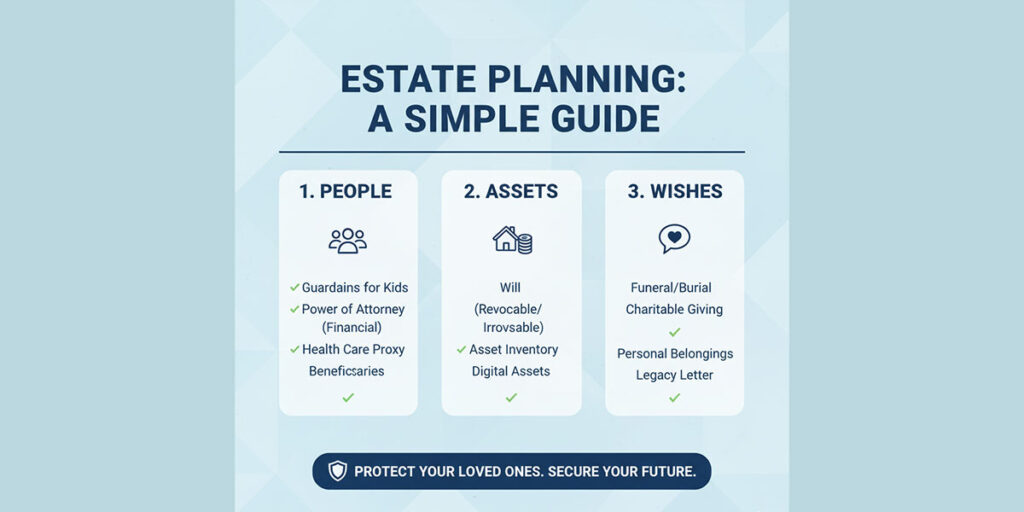Your Step-by-Step Guide to NY Estate Planning
For most people, the phrase “estate planning” sounds intimidating. It conjures images of complex legal documents, vast fortunes, and conversations reserved for the very wealthy or the very old. As an attorney with over 30 years of experience in this field, I can tell you that this is the single biggest misconception preventing New Yorkers from protecting their families. In reality, estate planning is not just for the wealthy—it is for everyone. At its heart, it’s not about mansions and stock portfolios; it’s about people.
So, what is estate planning? Let’s make it simple. Estate planning is creating a plan for how you want your property and your people to be taken care of if you are no longer able to do it yourself. That’s it. It’s a set of instructions you leave behind to make a difficult time easier for your loved ones. It’s your way of ensuring the people you love are provided for, the assets you’ve worked hard for are distributed according to your wishes, and your personal values are honored.
This guide is designed to demystify the entire process. We will walk you through it step-by-step, in plain English, breaking down a seemingly monumental task into a series of simple, understandable actions. At Morgan Legal Group, we believe that every adult in New York deserves the peace of mind that a well-crafted plan provides. Let’s begin this important journey together. For a personal strategy session, we invite you to get in touch with our team.
Step 1: Understand the “Why” – The Core Goals of Estate Planning
Before diving into the “what” and “how,” it is essential to understand the “why.” What are we actually trying to accomplish with an estate plan? When you understand the fundamental goals, the importance of each legal document becomes much clearer. An estate plan is not just about giving away your things; it’s a comprehensive strategy to achieve several crucial life objectives.
Goal A: To Provide for and Protect Your Loved Ones
This is the primary motivation for most people. Your plan is your final act of provision for your family. It allows you to specify exactly who receives your assets, how much they receive, and when they receive it. Without a plan, these decisions are left to a rigid state formula that may not reflect your wishes at all.
Key Considerations:
- Minor Children: Your plan is the only place you can nominate a guardian to raise your children. You can also create a trust to hold their inheritance, so a trusted adult you choose manages the money for their benefit until they are older and more mature.
- Adult Children: You can distribute assets in a way that protects them from their own financial mismanagement, creditors, or a future divorce through the use of trusts.
- Individuals with Special Needs: A direct inheritance can disqualify a loved one with a disability from receiving vital government benefits. A Special Needs Trust is an essential tool to provide for them without jeopardizing their eligibility.
- Blended Families: A plan can ensure your current spouse is provided for while also preserving an inheritance for children from a previous relationship.
Goal B: To Plan for Your Own Incapacity
Many people mistakenly believe that estate planning is only about what happens after you die. In reality, a huge part of a modern plan is protecting you while you are still alive. What would happen if a sudden illness or accident left you unable to manage your own affairs or make medical decisions? Without a plan, your family would have to go to court to get legal authority, a process known as guardianship.
A proper plan allows you to choose, in advance, who you want to make these decisions for you, avoiding the cost, delay, and public nature of a court proceeding.
Goal C: To Avoid Unnecessary Court Intervention
The legal processes of guardianship (for incapacity) and probate (for after-death administration) are the state’s default systems. They are public, can be expensive, and are often very slow. A primary goal of estate planning is to create a private plan that allows your chosen representatives to manage your affairs efficiently and without unnecessary court supervision. Tools like trusts and powers of attorney are specifically designed to achieve this.
Step 2: Meet the “Players” – The Key People in Your Plan
An estate plan is like a play. You are the director, and you need to cast a set of key characters who will carry out your vision. These roles, legally known as “fiduciaries,” are positions of immense trust and responsibility. Choosing the right people for these roles is one of the most important decisions you will make.
The Fiduciaries: Your Trusted Team
A fiduciary is a person or institution with a legal duty to act solely in your best interest. Here are the main players you will need to cast:
1. The Executor: Your “Wrap-Up Manager”
- Their Role: Named in your will, the executor is responsible for managing your estate through the probate process after your death.
- Their Duties: They will locate your will, hire an attorney, gather your assets, pay your final bills and taxes, and distribute the remaining property to your beneficiaries as your will directs.
- Who to Choose: Select someone who is organized, trustworthy, responsible, and a good communicator. They do not need to be a financial expert, but they must be diligent. Always name at least one backup (a “successor executor”).
2. The Trustee: Your “Money Manager”
- Their Role: If you create a trust, the trustee is responsible for managing the assets held within that trust according to the rules you establish. This role can last for many years.
- Their Duties: A trustee’s duties can include investing trust assets, making distributions to beneficiaries, and filing tax returns for the trust. This is a long-term management position.
- Who to Choose: This role requires financial acumen and impartiality, especially if the trust will last a long time or has complex family dynamics. You can choose a family member, a trusted friend, or a professional corporate trustee (like a bank). Our experts in wills and trusts can help you decide.
3. The Guardian: Your “Backup Parent”
- Their Role: For parents of minor children, this is the most important decision. The guardian is the person you nominate in your will to have physical custody of and raise your children if you and the other parent are deceased.
- Their Duties: To provide a safe, stable, and loving home for your children and make decisions about their upbringing, education, and healthcare.
- Who to Choose: This choice should be based on parenting style, values, stability, and a genuine love for your children. It is a decision that should be discussed at length with your potential choice.
4. The Agent under a Power of Attorney: Your “Financial Stand-In”
- Their Role: This person is empowered to make financial decisions for you if you become incapacitated.
- Their Duties: They can access your bank accounts, pay your bills, manage your investments, and handle your real estate. The power they wield is immense.
- Who to Choose: Absolute, unwavering trust is the number one requirement. This person must be someone of impeccable integrity. You can learn more about this role from a Power of Attorney specialist.
5. The Agent under a Health Care Proxy: Your “Healthcare Advocate”
- Their Role: This person will make medical decisions on your behalf if you are unable to communicate your own wishes.
- Their Duties: They will talk to your doctors, consent to or refuse treatment, and make end-of-life decisions based on their understanding of your values.
- Who to Choose: Select someone who can remain calm in a crisis, is assertive enough to advocate for you with medical professionals, and who clearly understands and respects your wishes regarding medical care.
Step 3: Assemble the “Toolkit” – The Core Legal Documents
Once you understand your goals and have thought about the people you trust, it’s time to look at the legal tools used to put your plan into action. Each document in your estate planning toolkit has a specific job. Together, they create a comprehensive safety net for you and your family.
Document 1: The Last Will and Testament
A will is the most well-known estate planning document, but its role is often misunderstood. It is a formal, written declaration of your wishes for what happens after you die.
- What It Does: A will allows you to name your executor, nominate a guardian for minor children, and direct how your “probate assets” (assets in your sole name) should be distributed.
- What It Doesn’t Do: A will has no effect until after you die, so it offers no protection for lifetime incapacity. Furthermore, it does not control the distribution of “non-probate” assets, like retirement accounts with beneficiary designations or assets held in a trust.
- New York Requirements: To be valid in New York, a will must be in writing, signed by you at the end, and witnessed by two individuals who also sign it in your presence.
Document 2: The Revocable Living Trust
Think of a Revocable Living Trust as a legal “bucket” that you create to hold your assets. You create the bucket, you put your assets into it, and you set the rules for how those assets are managed, both during your life and after your death.
- What It Is: A legal entity you create to own your property. It is “revocable” because you can change it or cancel it at any time during your life. While you are healthy, you typically act as your own trustee, managing the assets just as you always have.
- What It Does: Its primary benefit is that assets held in the trust completely avoid the probate process. This makes the settlement of your affairs faster, less expensive, and completely private. It is also an excellent tool for managing your affairs during incapacity, as your chosen successor trustee can step in to manage the trust assets without needing court permission. This is a key focus of our practice in New York City.
Document 3: The Durable Power of Attorney
This is your primary tool for lifetime incapacity planning on the financial side. It is a document where you grant a trusted agent the authority to handle your financial and legal affairs.
- Why It Must Be “Durable”: A traditional power of attorney terminates if you become incapacitated. A “durable” power of attorney includes specific language that allows it to remain effective even if you can no longer act for yourself. In New York, a POA is durable unless stated otherwise.
- What It Covers: You can grant your agent broad authority or limit their powers. This can include the power to handle banking, real estate transactions, tax matters, and government benefits. This is a cornerstone of our elder law practice.
Document 4: The Health Care Proxy and Living Will (Advance Directives)
These documents are your voice for your medical care when you are unable to speak for yourself. They are critically important for preserving your autonomy and relieving your family of agonizing decisions.
- Health Care Proxy: This document names your healthcare agent, the person you choose to make medical decisions for you.
- Living Will: This document states your personal wishes regarding end-of-life care, such as your preferences on the use of life-sustaining treatment. While not legally binding on its own in New York, it serves as powerful evidence of your wishes for your agent and medical providers.
- HIPAA Authorization: This is a companion document that gives your agents legal permission to access your confidential medical information.
Step 4: Take Action – The Simple Process of Creating Your Plan
Understanding the goals, players, and tools is the foundation. Now, here is a simple, actionable process for building your plan from the ground up.
- Gather Your Information: Before meeting with an attorney, take some time to inventory your assets and think about the key people in your life. Having this information organized will make the process more efficient.
- Define Your Personal Goals: What is most important to you? Is it avoiding probate? Protecting a child with special needs? Planning for long-term care? Knowing your priorities will help your attorney design the best plan for you.
- Schedule a Consultation: This is the most important step. An experienced estate planning attorney like Russel Morgan will not just draft documents; they will act as a counselor, listening to your goals and helping you navigate complex family and financial dynamics.
- Review, Understand, and Sign: Your attorney will draft your documents and then review them with you in detail to ensure they perfectly reflect your wishes. You will then sign them in a formal ceremony that meets all of New York’s legal requirements.
- Implement Your Plan: Creating the documents is not the end. You must fund your trust by retitling assets and update your beneficiary designations to align with your new plan.
- Store and Communicate: Keep your original documents in a safe place and let your chosen fiduciaries know where to find them. Provide your healthcare agent with a copy of your advance directives.
Conclusion: A Simple Plan for a Complicated World
Estate planning does not have to be an intimidating mystery. When broken down into these simple steps—understanding your goals, choosing your trusted helpers, assembling the right legal tools, and taking deliberate action—it becomes an accessible and empowering process. It is one of the most significant and responsible things you can do for yourself and the people you love.
A well-crafted plan provides a roadmap for your family, replacing confusion with clarity and anxiety with peace of mind. It is your final gift to them, a testament to your foresight and care. While this guide provides a simple framework, the advice of a knowledgeable attorney is essential to customize a plan that fits your unique life. The team at Morgan Legal Group is ready to guide you through every step of this journey. Schedule a consultation today and take the first simple step toward securing your family’s future.
For more basic information on this topic from a trusted source, you can review this guide from the American Bar Association.



